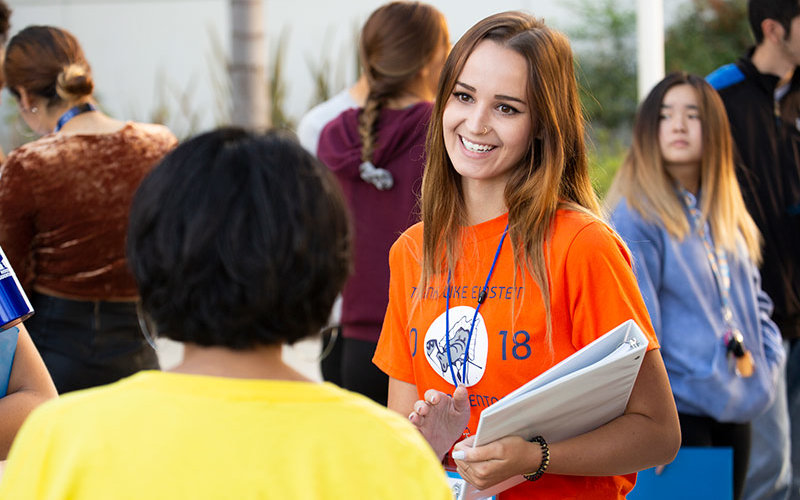
Inside a Cal State Fullerton lecture hall, first-year science and math students learn about the “chemistry” crisis of Flint, Michigan — how lead pipes tainted drinking water because phosphate was not added to the water supply.
“Phosphate makes the water safe to drink — fundamental chemistry,” Allyson Fry-Petit, assistant professor of chemistry and biochemistry, tells her class.
In another classroom, Merri Lynn Casem, professor of biological science, leads students through a case study about “nanobacteria” that highlights causal relationships, correlations, fallacies and the role of science in resolving controversy.
Welcome to “Think Like Einstein,” a new course this fall offered by the College of Natural Sciences and Mathematics.
The 16-week course gives incoming freshmen skills in critical thinking, argumentation, and logical and scientific reasoning to prepare them for the rigors of studying math and science — to think like a scientist or mathematician.
“We chose Einstein as our role model for how critical thinking and scientific reasoning can lead to the discovery of truths about our world,” Casem said. “Data that support some parts of Einstein’s theory of general relativity are only now being collected, but he was able to arrive at these ideas through critical thinking.”
Freshman Alex Moran is excited about the course because it shows new college students how to take a step back and think about situations with a critical eye.
“The class teaches us to process information instead of making quick decisions, investigate topics and make logical decisions about what we’re learning, and not take the first thing we’re learning as fact,” said Moran, a biological science major.
What’s unique about the course is the novel curricular format, developed by a team of faculty members with leadership from Marie Johnson, dean of the college. Students first participate in a three-week introductory module on critical thinking. For the next 10 weeks, students receive instruction from a rotating roster of five faculty members, each representing a different department: biological science, chemistry and biochemistry, geological sciences, physics and mathematics. Each instructor presents four lectures in their discipline over a two-week module, where students examine case studies, such as the Flint water crisis, and apply critical thinking skills.
“The faculty within the college are inherently scientific and logical thinkers,” Casem noted. “However, the way a biologist thinks about a problem is probably different from the way a geologist or mathematician might think about it.”
The course also helps reinforce students’ decisions on choosing their major, and to connect with peers to foster a community of learners. “One of our goals is to help students discover the major that is the best fit for them,” said Fry-Petit.
In the final module, students engage in a term project and apply critical thinking skills to problems related to science and society. The course also features a “first-year experience” class on Fridays. Students meet in small groups led by 25 peer mentors to give them a “sense of belonging” within the college’s academic and scientific community. This effort is designed to improve retention, persistence and time to graduation among math and science majors — linked to Graduation Initiative 2025.